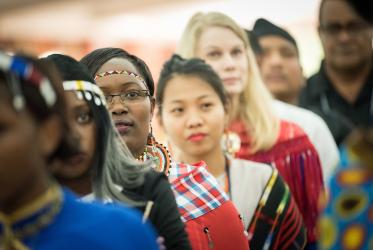“From the very beginning, women in the ecumenical movement have been raising the question of who is missing around the table and why,” said Dr Fulata Mbano-Moyo, speaking in a panel on “women and ecumenism” at the 4th Latin American Congress on Gender and Religion, held from 6 to 8 August in São Leopoldo, Brazil.
Besides Moyo, who serves as the WCC programme executive for the Just Community of Women and Men, the panel was formed by Rev. Romi Márcia Bencke, general secretary of the National Council of Christian Churches of Brazil (CONIC), and Cecilia Castillo Nanjari, programme executive for Women and Gender Justice at the Latin American Council of Churches (CLAI).
Reflecting on the need to strengthen historic networks of women in the ecumenical movement, Moyo made reference to the work of Henrietta Visser't Hooft, Twaila Carver and Kathleen Bliss. “For these women, ecumenism was about building a community that works for justice,” she said.
“This community was not marked by uniformity, but diversity, because diverse perspectives would enrich the process of justice,” added Moyo.
Recent examples of discrimination and violation of women’s rights remained a focus of the presentation by two Latin American speakers at the panel. Bencke spoke about the challenges she sees as an executive of the main ecumenical body of Brazil. “I have been witnessing gender issues being vanished from the Brazilian congress’ agenda – thanks to the lobbying of Christian fundamentalist groups,” she said.
“This is causing increased stigma for civil society groups that work for gender and feminist causes,” added Bencke.
“Churches and the ecumenical movement are a space for justice, peace and solidarity,” she continued. “This is precisely why we are shocked by the constant use of biblical quotes that presumably justify deeds of religious intolerance, exclusion and fragmentation of Christianity and society as a whole,” she concluded.
For Cecilia Castillo Naranji, one of the key current tasks of ecumenical networks of women should be to “identify and denounce expressions that sexism and patriarchy have today.”
A pastor of the Chilean Pentecostal Mission Church, Naranji spoke as the coordinator of the CLAI’s women’s network. CLAI is currently present in over 20 countries in Latin America and has a sharp focus on gender justice.
At the congress, Rev. Dr Elaine Neuenfeldt, secretary for Women in Church and Society at the Lutheran World Federation (LWF), stressed that issues emerging from women’s experience must be fully integrated in the agenda of ecumenical organizations.
“Through dialogue, the ecumenical movement must amplify women’s voices. The ecumenical bodies must go beyond good intentions and build intentional policies, platforms and processes where gender justice is clearly articulated and amplified as a theological and faith concern,” she said.
Moyo, also the keynote speaker at the closing session of the congress, stressed the need to work together as a way to overcome exclusion and oppression.
“Our main goal in the ecumenical movement is to nurture a just participation where women and men can reach their higher potential in the service to God,” she said.
The 4th Congress on Gender and Religion was supported by the Church of Sweden and local education platforms such as the National Council of Scientific and Technologic Development (CNPQ), the Coordination for the Improvement of Higher Education Personnel (CAPES) and the Foundation to Support Research of the State of Rio Grande do Sul (FAPERGS).
The event was supported by the Research Center on Gender of Faculdades EST. Faculdades EST is a theologiocal seminary of the Evangelical Church of the Lutheran Confession in Brazil.








